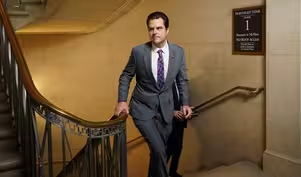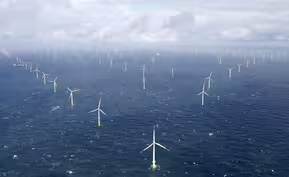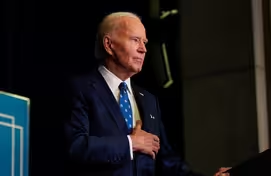
Tamara Keith and Amy Walter on Biden's moves, GOP's fissures
Clip: 12/23/2024 | 8m 27sVideo has Closed Captions
Tamara Keith and Amy Walter on Biden's big moves and the Republicans’ funding fight
NPR’s Tamara Keith and Amy Walter of the Cook Political Report with Amy Walter join William Brangham to discuss the latest political news, including President Biden's big decisions with just weeks left in office and how a funding fight reveals potential cracks in the GOP as Republicans prepare to take power.
Problems playing video? | Closed Captioning Feedback
Problems playing video? | Closed Captioning Feedback
Major corporate funding for the PBS News Hour is provided by BDO, BNSF, Consumer Cellular, American Cruise Lines, and Raymond James. Funding for the PBS NewsHour Weekend is provided by...

Tamara Keith and Amy Walter on Biden's moves, GOP's fissures
Clip: 12/23/2024 | 8m 27sVideo has Closed Captions
NPR’s Tamara Keith and Amy Walter of the Cook Political Report with Amy Walter join William Brangham to discuss the latest political news, including President Biden's big decisions with just weeks left in office and how a funding fight reveals potential cracks in the GOP as Republicans prepare to take power.
Problems playing video? | Closed Captioning Feedback
How to Watch PBS News Hour
PBS News Hour is available to stream on pbs.org and the free PBS App, available on iPhone, Apple TV, Android TV, Android smartphones, Amazon Fire TV, Amazon Fire Tablet, Roku, Samsung Smart TV, and Vizio.
Providing Support for PBS.org
Learn Moreabout PBS online sponsorshipWILLIAM BRANGHAM: President Biden makes a big decision with just weeks left in office.
And, with Republicans set to take power, a funding fight reveals potential cracks in the GOP.
It is a perfect time for a Politics Monday duo.
That's Amy Walter of The Cook Political Report With Amy Walter, and Tamara Keith of NPR.
Welcome to you both.
AMY WALTER, The Cook Political Report: Thank you.
WILLIAM BRANGHAM: Tam, sorry we couldn't have you sitting here with us.
But, starting with you, Tam, I mean, Biden is near the end of his term.
As he has with his entire political career, he's been going all out on this legal front, the commutations we saw today following thousands of others before that, pushing a lot of judges through to confirmation.
How much of this is just normal, end-of-term, end-of-political-career tidying up, and how much of this is eying the incoming administration?
TAMARA KEITH, National Public Radio: Well, certainly, President Biden was chairman of the Senate Judiciary Committee for a significant part of his career.
And he, as soon as he came into office, had his eye on these judicial positions.
When President Trump was in office, he set a near record with the number of nominees that he was able to get confirmed to lifetime positions.
And that really shaped the court and, in a way, helped shape the Biden presidency because there were times where policies he wanted came up against Trump-appointed judges.
Well, now Biden has beaten Trump's number of these lifetime appointments.
And those nominees, those appointments, those judges will then shape the legal opinions that go forward, the legal opinions that will affect the Trump presidency, at least partially.
As far as the pardons and commutations, the announcement today is essentially Biden trying to do criminal justice reform to change federal policy by way of the power that he does have, which is that power of pardons and commutations.
WILLIAM BRANGHAM: Right.
I mean, Amy, what do you make of all of this activity?
AMY WALTER: In the power that he wanted to have through the legislative process, right, he wanted... WILLIAM BRANGHAM: And was denied.
AMY WALTER: And was denied that.
And so we have talked a lot about this incoming president and what he can and cannot do with the legislative body that he has.
But it's just a reminder of how much you can do as executive, even though it is not changing the law permanently.
The interesting thing in looking at these last few months here, or last few weeks, especially, of the Biden administration, is the thinking through the man and what his legacy will be.
And we have had pretty young presidents in these last era who were able to watch their legacy change over the period of time while they were still alive, our interpretations of their legacy.
This is not a man who will be alive to see that.
And so what he seems to be doing is putting in place things that he wants to -- that others will be able to make that determination about what his presidency was or wasn't.
And he's just going to go out doing the things that he had said he wanted to do when he was running for president, one of those, lifting the death penalty.
And as -- again, complicated legacy, but, as a Catholic, I think this was one of those tenets that had -- he had stood by pretty consistently.
WILLIAM BRANGHAM: Right, always stuck with him.
AMY WALTER: Always stuck with that.
WILLIAM BRANGHAM: Right.
Tam, this week, as you saw, we had this pretty shocking turn of events with this government funding deal pulled from the brink of disaster at the very, very last minute, but not before Trump and his able lieutenant, Elon Musk, torpedoed the first one, tried to get a second one to their liking past, which then engendered this revolt within the GOP and showed some fissures in the incoming president's prowess.
What do you make of all of that, how that turned out and what it revealed?
TAMARA KEITH: One thing that I think we have talked about before is that President Trump will come in a lame-duck.
That is, his term is only going to last four years.
And when he's gone -- and it's only going to last four years, and after two years or so, people are going to be running for office.
He's coming in with this narrow, like, as narrow as you can get, House majority, and has really, really ambitious goals.
And so what he was trying to do by blowing up that initial deal and then trying to get something else, and then the conservatives revolted, what he was trying to do was sort of smooth the path for his ambitious legislative and executive agenda.
What became clear this week is that that path is not going to be smooth for any number of reasons.
One is that House Republicans and even Senate Republicans are not a monolith, and they aren't necessarily going to do exactly what he wants in exactly the way he wants it.
And, also, he has sort of returned to form.
He certainly had help from Elon Musk, who was stoking concerns about that deal, that bipartisan deal, online.
But Trump returned to form, which is, even when his party controlled both the House and the Senate, he actually blew up a deal that they had amongst themselves back when he was president that led to a government shutdown.
And so this sort of chaos that was experienced in the last week, I don't think that's the last time we're going to see it.
AMY WALTER: Yes, and I do -- I think that was really an important point.
It's not just that he has the narrowest of margins.
Remember, there were more than 30 Republicans who voted against this.
So, even with a larger majority, this would not have been able to pass just on Republican votes alone.
WILLIAM BRANGHAM: Right.
AMY WALTER: And the point about -- that Tam made about the first two years being critical, that's absolutely right.
It's not just that people start running for president two years from now.
It's that there's a midterm election and the odds that that party in power holds onto both the House and the Senate, more like -- the Senate is much harder to flip.
But the House, that could be very difficult for Republicans to hold onto once again.
So there is a very narrow window, if the Republicans are going to pass this very ambitious agenda, even one that just tackles taxes and the border, which is what the president has sort of put on the top of his priority list.
Now, it may look different when he's the president.
Republicans are in charge of the Senate, and so the pressure is a little bit different on these individual members of Congress.
But I do think that this -- really, the challenge for Republicans is that there is a populist president, but that doesn't necessarily mean that every member of the Republican Conference is on board with that sort of agenda.
There are still many folks very much believe in deficit -- there are deficit hawks, as well as folks who want to see less government spending on some of the big entitlement programs.
WILLIAM BRANGHAM: Right.
Tam, in just the last 30 seconds we have, I know you have been reporting on this a bit.
We have mentioned Elon Musk and his influence with the White House, the incoming White House.
President Trump clearly does not seem to like that.
He spoke out about it yesterday at a political action conference.
What do you make of this, him trying to push back at the idea that Elon Musk actually has some political sway?
TAMARA KEITH: Yes, he -- well, President Trump does not like people blocking his sunlight, and this is a longstanding issue that he has had, where, if there is a close adviser who starts getting credit for things, he often turns on them.
We don't know whether this is going to happen with Elon Musk.
Well, we kind of know that it's likely to happen.
We don't know when it will happen or in exactly what form.
WILLIAM BRANGHAM: Tamara Keith and Amy Walter, so nice to see you both.
Thank you so much for being here.
AMY WALTER: You're welcome.
TAMARA KEITH: You're welcome.
Arturo Sandoval on falling in love with music
Video has Closed Captions
Clip: 12/23/2024 | 9m 33s | Arturo Sandoval on falling in love with music and his journey to international fame (9m 33s)
Candy Cane Lane lights up St. Louis
Video has Closed Captions
Clip: 12/23/2024 | 2m 37s | Candy Cane Lane lights up St. Louis and brings the true meaning of Christmas (2m 37s)
China's adoption ban leaves children and families in limbo
Video has Closed Captions
Clip: 12/23/2024 | 9m 22s | China's foreign adoption ban leaves hundreds of children and families in limbo (9m 22s)
House report on Matt Gaetz alleges rampant illegalities
Video has Closed Captions
Clip: 12/23/2024 | 4m 25s | House report on former Rep. Matt Gaetz reveals rampant sexual misconduct, drug use (4m 25s)
News Wrap: Luigi Mangione pleads not guilty to CEO's murder
Video has Closed Captions
Clip: 12/23/2024 | 4m 26s | News Wrap: Luigi Mangione pleads not guilty to murdering head of United Health Care (4m 26s)
Researchers race to answer questions about wind energy
Video has Closed Captions
Clip: 12/23/2024 | 8m 49s | Researchers race to answer questions about the unintended consequences of wind energy (8m 49s)
Why Biden commuted the sentences of 37 people on death row
Video has Closed Captions
Clip: 12/23/2024 | 5m 29s | Why Biden commuted the sentences of 37 people on federal death row (5m 29s)
Providing Support for PBS.org
Learn Moreabout PBS online sponsorship
- News and Public Affairs

FRONTLINE is investigative journalism that questions, explains and changes our world.

- News and Public Affairs

Amanpour and Company features conversations with leaders and decision makers.












Support for PBS provided by:
Major corporate funding for the PBS News Hour is provided by BDO, BNSF, Consumer Cellular, American Cruise Lines, and Raymond James. Funding for the PBS NewsHour Weekend is provided by...






